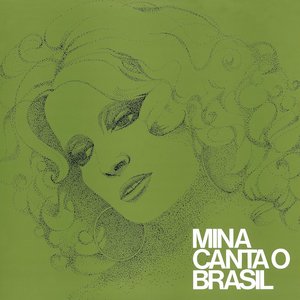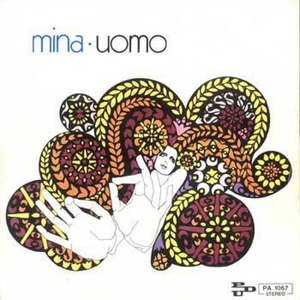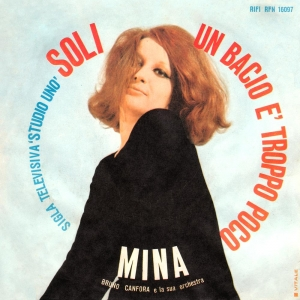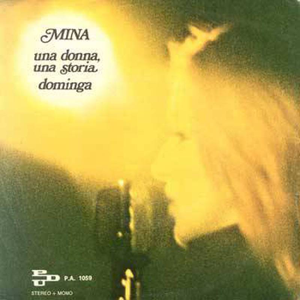
Mina Anna Maria Mazzini or Mina Anna Quaini, known mononymously as Mina, is an Italian singer and actress. She was a staple of television variety shows and a dominant figure in Italian pop music from the 1960s to the mid-1970s, known for her three-octave vocal range, the agility of her soprano voice, and her image as an emancipated woman.

Catene is a double studio album by Italian singer Mina, released in October 1983 by PDU and distributed by EMI Italiana.

Del mio meglio n. 3 is a compilation album by Italian singer Mina, released in 1975 by PDU and distributed by EMI Italiana.

Cinquemilaquarantatre is a studio album by Italian singer Mina, released on 29 May 1972 by PDU.

Canzonissima '68 is a studio album by Italian singer Mina, released in 1968 by PDU and distributed by Durium.

Studio Uno 66 is a studio album by Italian singer Mina, released in June 1966 by Ri-Fi.

Studio Uno is a studio album by Italian singer Mina, released in March 1965 by Ri-Fi. All songs were performed during the Saturday TV show Studio Uno. Thanks to such super hits as "Città vuota", "È l'uomo per me", "Un anno d'amore", "Un buco nella sabbia", "Io sono quel che sono" e "L'ultima occasione", the record reached the top of the Italian chart.

Wilson Simonal de Castro was a Brazilian singer. He was a singer with great success in the 1960s and in the first half of the 1970s. He was married two times and had two sons: Wilson Simoninha and Max de Castro, both are artists today. He also had a daughter, named Patricia.
Marcel Zanini was a Turkish-born French jazz musician.

Mina canta o Brasil is a studio album by Italian singer Mina, released in 1970 by PDU. The album, inspired by Brazilian culture, is completely recorded in Portuguese.

Salomè is a double studio album by Italian singer Mina, released in November 1981 by PDU.

"Una casa in cima al mondo" is a 1966 Italian song composed by Vito Pallavicini and Pino Donaggio. The song premiered at the 16th edition of the Sanremo Music Festival, with a double performance by Donaggio and Claudio Villa, and placed at the fourth place.

"Uomo" is a song by Italian singer Mina. It was written by Enrico Riccardi with lyrics by Luigi Albertelli.
"Due note" is a song recorded by Italian singer Mina. It was written by Bruno Canfora, Antonio Amurri, Raffaele Sposito, and the arrangement for the song was prepared by Tony De Vita. The song became the final theme of the 1960 television broadcast of Canzonissima, and the following year it was included in the album of the same name.

"Soli" is a song recorded by Italian singer Mina. The song was written by Franco Castellano, Giuseppe Moccia and Bruno Canfora as the final theme of the TV program Studio Uno. Released as a single, the song entered the top 10 of the Italian chart. The song "Un bacio è troppo poco" was used as the B-side. None of the songs were included on any of Mina's studio albums.
"Take It Easy My Brother Charles" is a song composed by Brazilian singer and composer Jorge Ben. Released in November 1969, it is part of the studio album Jorge Ben and an EP.

"Una donna, una storia" is a song by Italian singer Mina, recorded for her 1970 studio album ...quando tu mi spiavi in cima a un batticuore.... It was written by Gianni Ferrio and Antonio Amurri. Released in February 1971 as the second single from the album, the song reached number nine on the Italian chart, staying there for 12 weeks. "Dominga", which is an Italian cover version of the Portuguese song "Domingas" by Jorge Ben Jor, was used as the B-side of the single.

"Vorrei che fosse amore" is a song written by Antonio Amurri and Bruno Canfora. Italian singer Mina recorded it in 1968 as the final theme of the musical TV show Canzonissima. The song was later included on her album Canzonissima '68, and was also released as a single, reaching number 9 on the Italian chart. According to Cash Box magazine, it was ranked 77th on the list of the best-selling singles in Italy between July 1968 and July 1969.

"Comincia tu" is a song written by Massimiliano Pani and Piero Cassano for Italian singer Mina. The song was released as a single from the album Catene with "La nave" on the back in October 1984. The single was later re-released with a disco mix of "Comincia tu" and the song "Brigitte Bardot" as the b-side. Nevertheless, the single performed modestly on the charts.
















